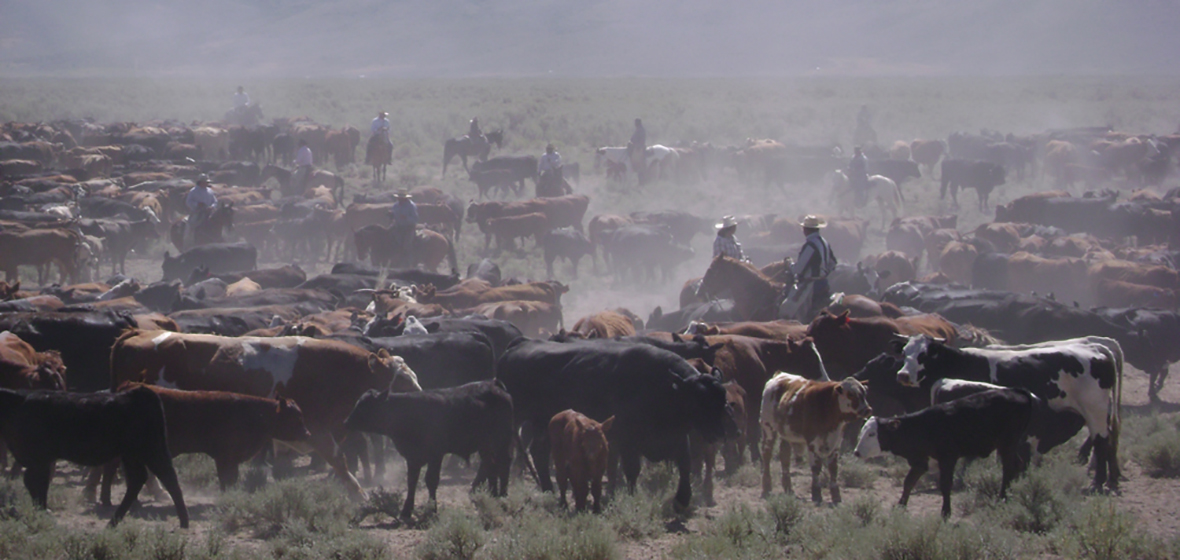University of Nevada Cooperative Extension's Herds and Harvest Program is offering certification classes this June and July for those who want to learn about meat harvesting and processing. Basics 1 and Basics 2 are hands-on classes, taught in partnership with the University's College of Agriculture, Biotechnology and Natural Resources, that teach skills in food safety and the slaughter and processing of livestock, and that provide insight into the processing and retail sales of meat in Nevada.
"This program is for beginning farmers and ranchers, agriculture producers involved in the meat industry, or others interested in where their meat comes from," said Extension Educator Staci Emm, who helped coordinate the classes.
The first Basics 1 session is on July 7 and covers the basics of meat harvest (slaughter). The second Basics 1 session is on July 19 and covers processing (cutting). Participants will learn how to keep meat safe and sanitary for consumers, while maximizing the meat's use and profit. Each session has its own certification, and though taking both is recommended, it is not required for certification. Both sessions are 6:30 a.m. - 1 p.m. at Wolf Pack Meats, 5895 Clean Water Way in Reno. Register for Basics 1 Slaughter at http://slaughter-july07-2016.eventbrite.com/, and for Basics 1 Processing at https://processing-july19-2016.eventbrite.com/. Each Basics 1 session costs $135.
Basics 2 is offered June 30 - July 1, and participants must attend both days. The June 30 session will take place at the University of Nevada, Reno Agriculture Experiment Station, 8311 Clean Water Way in Reno at 8 a.m. It will cover how packers make their money. Topics include the USDA Grade & Yield System; livestock evaluation; grade and yield; a live evaluation of cattle and ultrasound evaluation of cattle; business planning; enterprise budgets for Farm-to-Fork operation; marketing; and what restaurant owners, wholesalers and retail sellers are looking for in their meat.
The July 1 session will begin at 8 a.m. at Wolf Pack Meats and end at the University of Nevada, Reno Fleischmann Agriculture Building on campus, at Evans Avenue and East Ninth Street in the meat lab. The session will cover different cuts of meat, tenderness and packaging.
Register for Basics 2 online at https://basics2-june30andjuly1-2016.eventbrite.com/. The cost of the two-day workshop is $250.
"This series is especially for small-livestock producers to get them more familiar with the process of how to get their meat directly to the market," said Extension Educator Steve Foster, who is teaching the series. "It's for producers who want to know about processing and what the meat packers are looking for."
Those attending are encouraged to preregister at the websites given above to ensure ample space and educational materials are available. Or, register by contacting Jessica Anderson, 775-945-3444, ext.12 or andersonj@unce.unr.edu. Persons in need of special accommodations or assistance should call at least three days prior to the trainings they intend to attend.
The University began offering the courses in spring 2014. Since then, at least 90 producers have been certified, and demand for the trainings remains high.
The workshops are part of Cooperative Extension's Herds and Harvest Program that helps farmers and ranchers across the state develop agricultural entrepreneurship, implement sustainable agricultural marketing strategies and improve profitability. The program is in collaboration with the University's College of Agriculture, Biotechnology and Natural Resources; and is supported by the USDA's Risk Management Agency and the USDA's Beginning Farmer and Rancher Development Program of the National Institute of Food and Agriculture.












